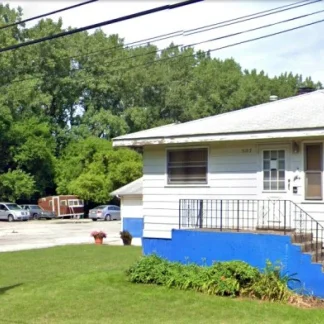New Horizon
New Horizon is a private rehab located in Gary, Indiana. New Horizon specializes...
Serenity House of Gary is a half-way house for those individuals that are recovering from substance addiction. Serenity House of Gary is located in Gary, Indiana
Serenity House of Gary is committed to helping those individuals that are making the journey to sobriety. They offer a safe and friendly environment that encourages their client to achieve their best.
Serenity House of Gary offers housing services for those individuals that are looking for a safe and comprehensive environment. Their program is based on the 12 step methodology and holds AA Meetings weekly. During treatment, patients at Serenity House of Gary will also learn life skills.
Contact us for more information: (219) 980-1955

Connect with Serenity House of Gary by calling their admissions team directly.
(219) 980-1955 Website Get DirectionsGroup therapy is any therapeutic work that happens in a group (not one-on-one). There are a number of different group therapy modalities, including support groups, experiential therapy, psycho-education, and more. Group therapy involves treatment as well as processing interaction between group members.
In individual therapy, a patient meets one-on-one with a trained psychologist or counselor. Therapy is a pivotal part of effective substance abuse treatment, as it often covers root causes of addiction, including challenges faced by the patient in their social, family, and work/school life.
Life skills trainings involve all the skills a person must have in order to function successfully in the world. These include time management, career guidance, money management, and effective communication. Truly successful addiction recovery is based on the ability to not only live substance-free, but to thrive. Life skills teaches the practical necessities of functioning in society, which sets clients up for success in life, and therefore sobriety.
In individual therapy, a patient meets one-on-one with a trained psychologist or counselor. Therapy is a pivotal part of effective substance abuse treatment, as it often covers root causes of addiction, including challenges faced by the patient in their social, family, and work/school life.
Life skills trainings involve all the skills a person must have in order to function successfully in the world. These include time management, career guidance, money management, and effective communication. Truly successful addiction recovery is based on the ability to not only live substance-free, but to thrive. Life skills teaches the practical necessities of functioning in society, which sets clients up for success in life, and therefore sobriety.
Life skills trainings involve all the skills a person must have in order to function successfully in the world. These include time management, career guidance, money management, and effective communication. Truly successful addiction recovery is based on the ability to not only live substance-free, but to thrive. Life skills teaches the practical necessities of functioning in society, which sets clients up for success in life, and therefore sobriety.
New Horizon is a private rehab located in Gary, Indiana. New Horizon specializes...
Fresh Start Counseling Services is a private rehab located in Merrillville, IN. ...
CleanSlate Outpatient Addiction Medicine Merrillville is a private rehab located...
Edgewater Behavioral Health Balanced Living is a private rehab located in Gary, ...